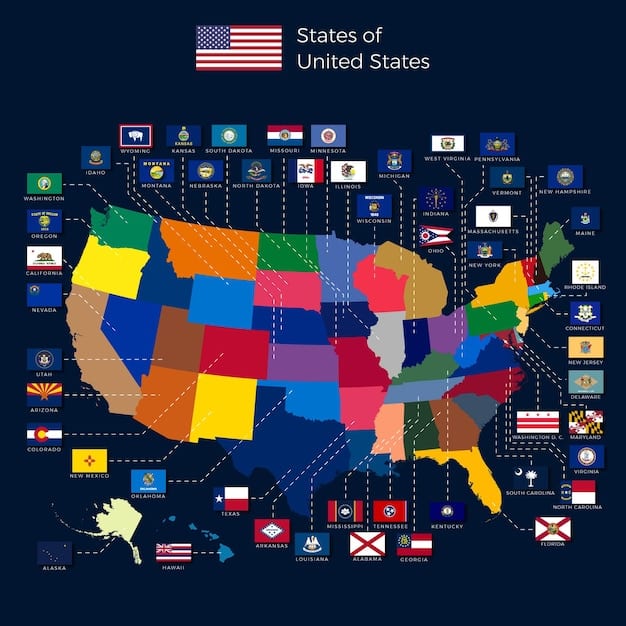New Data Breach Laws in 2025: Protecting Your Online Privacy in the US

New Data Breach Laws in 2025: How They Impact Your Online Privacy Rights in US are poised to revolutionize data protection, granting individuals greater control over their personal information and imposing stricter requirements on businesses to safeguard data and promptly report breaches.
Navigating the digital age requires constant vigilance, especially when it comes to protecting your personal data. Understanding the landscape of New Data Breach Laws in 2025: How They Impact Your Online Privacy Rights in US is crucial for every internet user.
Understanding the Current Data Privacy Landscape
Before we delve into the specifics of the upcoming data breach laws in 2025, it’s essential to understand the current state of data privacy in the United States. This understanding sets the stage for appreciating the significant changes these new laws will bring.
Existing Federal Laws
The US currently lacks a comprehensive federal data privacy law. Instead, it relies on a patchwork of sector-specific laws. Some key federal laws include:
- HIPAA (Health Insurance Portability and Accountability Act): Protects individuals’ medical records and other health information.
- COPPA (Children’s Online Privacy Protection Act): Regulates the online collection of personal information from children under 13.
- GLBA (Gramm-Leach-Bliley Act): Requires financial institutions to protect consumers’ sensitive financial information.
- FCRA (Fair Credit Reporting Act): Governs the collection, use, and sharing of consumer credit information.
State-Level Data Privacy Laws
Recognizing the gaps in federal protection, many states have enacted their own data privacy laws. California’s CCPA (California Consumer Privacy Act) and CPRA (California Privacy Rights Act) are among the most comprehensive, granting consumers rights such as the right to know, the right to delete, and the right to opt-out of the sale of their personal information. Other states with notable data privacy laws include Virginia, Colorado, and Utah.

In conclusion, the current data privacy landscape in the US is fragmented. While federal laws address specific sectors, state laws are increasingly filling the void with broader protections. The New Data Breach Laws in 2025: How They Impact Your Online Privacy Rights in US aim to address these inconsistencies and strengthen consumer protection across the board.
Key Provisions of the New Data Breach Laws in 2025
The anticipated New Data Breach Laws in 2025: How They Impact Your Online Privacy Rights in US represent a significant shift in the way personal data is handled. These laws introduce several key provisions designed to enhance consumer protection and hold businesses accountable.
Comprehensive Federal Standard
One of the most important aspects of the new legislation is the establishment of a comprehensive federal standard for data protection. This aims to replace the current patchwork of state and sector-specific laws with a unified set of rules applicable across the country.
Expanded Definition of Personal Data
The laws expand the definition of “personal data” to include a wider range of information, such as:
- Biometric data (e.g., fingerprints, facial recognition data)
- Geolocation data
- Online browsing and search history
- Inference data (i.e., data used to create profiles about individuals’ preferences and behaviors)
This broader definition ensures that more types of information are protected under the new laws.
Stricter Data Security Requirements
Businesses will be required to implement more robust data security measures to protect personal data from unauthorized access, use, or disclosure. This includes:
- Implementing and maintaining a comprehensive data security program
- Conducting regular risk assessments
- Using encryption and other security technologies
- Providing employee training on data security practices
These requirements aim to prevent data breaches before they occur.
Mandatory Data Breach Notification
The new laws establish a national standard for data breach notification. Businesses will be required to notify affected individuals and relevant government agencies within a specified timeframe after discovering a data breach. This notification must include details about the breach, the types of personal data involved, and steps individuals can take to protect themselves.
In short, the New Data Breach Laws in 2025: How They Impact Your Online Privacy Rights in US aim to create a strong, consistent framework for data protection across the country, empowering individuals and holding businesses responsible for safeguarding personal information.

How the New Laws Impact Your Online Privacy Rights
The New Data Breach Laws in 2025: How They Impact Your Online Privacy Rights in US significantly enhance your control over your personal information. These laws grant you several key rights that empower you to manage your data more effectively.
Right to Access
You have the right to access the personal data that businesses have collected about you. This allows you to review the information and ensure its accuracy. Businesses must provide this information in a clear, understandable format.
Right to Correct
If you discover that the personal data a business has about you is inaccurate or incomplete, you have the right to request that the business correct it. This ensures that your information is up-to-date and reliable.
Right to Delete
In many cases, you have the right to request that a business delete your personal data. This right is particularly important for information that is no longer necessary for the purpose for which it was collected.
Right to Opt-Out
You have the right to opt-out of the sale of your personal data. This means that businesses cannot sell your information to third parties without your consent. You also have the right to opt-out of targeted advertising and profiling based on your personal data.
These new rights provide individuals with greater control over their personal data, giving them the ability to access, correct, delete, and opt-out of the sale or use of their information. The New Data Breach Laws in 2025: How They Impact Your Online Privacy Rights in US aim to empower individuals to protect their privacy in the digital age.
Responsibilities of Businesses Under the New Laws
The New Data Breach Laws in 2025: How They Impact Your Online Privacy Rights in US place significant responsibilities on businesses to protect personal data. These responsibilities are designed to ensure that businesses handle data responsibly and are held accountable for any breaches.
Data Security Program
Businesses are required to implement and maintain a comprehensive data security program. This program must include:
- Regular risk assessments to identify vulnerabilities in data security practices.
- Implementation of appropriate security measures, such as encryption and access controls.
- Employee training on data security policies and procedures.
- Incident response plans to address data breaches effectively.
Data Minimization
Businesses should only collect and retain personal data that is necessary for the purposes for which it was collected. This principle, known as data minimization, helps to reduce the risk of data breaches and protect individuals’ privacy.
Transparency
Businesses must be transparent about their data collection and use practices. This includes providing clear and concise privacy policies that explain:
- What types of personal data are collected.
- How the data is used.
- With whom the data is shared.
- How individuals can exercise their rights under the new laws.
Data Breach Notification
In the event of a data breach, businesses must promptly notify affected individuals and relevant government agencies. This notification must include:
- A description of the breach.
- The types of personal data involved.
- Steps individuals can take to protect themselves.
- Contact information for the business.
By adhering to these responsibilities, businesses can help to protect personal data and maintain the trust of their customers. The New Data Breach Laws in 2025: How They Impact Your Online Privacy Rights in US aim to create a culture of accountability and responsibility when it comes to data protection.
Preparing for the Implementation of the New Laws
As the implementation date of the New Data Breach Laws in 2025: How They Impact Your Online Privacy Rights in US approaches, it’s crucial for both individuals and businesses to prepare. Taking proactive steps now can help ensure a smooth transition and maximize the benefits of the new regulations.
For Individuals
Individuals can take several steps to protect their online privacy and prepare for the new laws:
- Review Privacy Policies: Read the privacy policies of the websites and services you use to understand how your data is being collected and used.
- Adjust Privacy Settings: Take control of your privacy settings on social media platforms and other online services.
- Use Strong Passwords: Create strong, unique passwords for each of your online accounts.
- Enable Two-Factor Authentication: Add an extra layer of security to your accounts by enabling two-factor authentication.
For Businesses
Businesses need to take a more comprehensive approach to prepare for the new laws:
- Conduct a Data Audit: Identify what types of personal data you collect, where it’s stored, and how it’s used.
- Update Your Privacy Policies: Ensure that your privacy policies are clear, concise, and compliant with the new laws.
- Implement a Data Security Program: Develop and implement a comprehensive data security program that includes risk assessments, security measures, and employee training.
- Create an Incident Response Plan: Develop a plan for responding to data breaches, including notification procedures and steps to mitigate damage.
By taking these preparatory steps, both individuals and businesses can ensure that they are ready for the implementation of the New Data Breach Laws in 2025: How They Impact Your Online Privacy Rights in US and can take full advantage of the enhanced privacy protections they provide.
The Future of Online Privacy in the US
The New Data Breach Laws in 2025: How They Impact Your Online Privacy Rights in US are poised to shape the future of online privacy in the United States. These laws represent a significant step forward in protecting individuals’ personal data and holding businesses accountable for their data handling practices.
Increased Consumer Trust
By granting individuals greater control over their personal information and requiring businesses to be more transparent about their data practices, the new laws are likely to increase consumer trust in the online environment.
Innovation and Competition
The new laws may also spur innovation and competition in the data privacy space. Businesses may be incentivized to develop new technologies and services that prioritize data protection and respect individuals’ privacy rights.
Ongoing Evolution
Data privacy is an evolving field, and it’s likely that the New Data Breach Laws in 2025: How They Impact Your Online Privacy Rights in US will be subject to ongoing refinement and adaptation. As technology continues to advance and new data privacy challenges emerge, the laws will need to be updated to keep pace.
In conclusion, the New Data Breach Laws in 2025: How They Impact Your Online Privacy Rights in US are expected to have a profound impact on the future of online privacy in the US. By strengthening consumer protections, promoting responsible data handling practices, and fostering innovation, these laws will help to create a more secure and trustworthy online environment.
| Key Aspect | Brief Description |
|---|---|
| 🛡️ Comprehensive Standard | Establishes a unified federal standard for data protection across the US. |
| 🔑 Enhanced Rights | Grants rights to access, correct, delete, and opt-out of data sales. |
| 💼 Business Responsibilities | Requires businesses to implement robust security and transparent practices. |
| 🚨 Breach Notification | Mandates timely notification to individuals and agencies after a data breach. |
FAQ
▼
The definition includes biometric, geolocation, online browsing history, and inference data, expanding beyond traditional identifiers like names and addresses for better protection.
▼
You have the right to access, correct, and delete your data. Also, you can opt out of the sale of your personal information or targeted advertising.
▼
Businesses must implement robust data security programs, minimize data collection, be transparent about data practices, and provide breach notifications.
▼
Review privacy policies, adjust privacy settings, use strong passwords, and enable two-factor authentication to enhance your online security measures.
▼
Violations can result in significant fines, penalties, and legal action. Affected consumers may also be able to seek damages in court.
Conclusion
The impending New Data Breach Laws in 2025: How They Impact Your Online Privacy Rights in US mark a transformative era for data protection, empowering consumers with greater control and mandating robust safeguards from businesses, ultimately shaping a more secure digital future.





